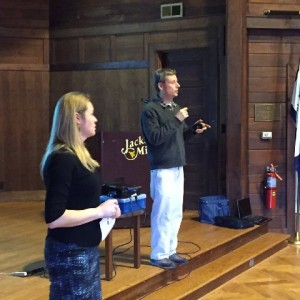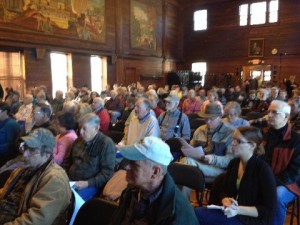Jackson’s Mill Meeting – Appalachian Mountain Advocates stands ready to help landowners
From S. Tom Bond, Retired Chemistry Professor & Resident Farmer, Lewis County, WV
Mountain Lakes Preservation Alliance held meeting concerning the complaints of rural residents regarding the numerous planned pipelines in West Virginia and surrounding states Saturday, January 10. It was held in the West Virginia Building at Jackson’ s Mill 2:00 to 5:00 pm.
The presentation was made by the Greenbrier River Watershed Association. which has held over a dozen such meetings previously. The first speaker was Elsie Keaton, Outreach and Education Coordinator. Her talk involved the location and character of the four main pipelines, three of which are 42 inches in diameter and one 36, and several smaller ones which lead to and supply them.
The pipelines will require 75 foot rights of way and will go through numerous streams, both causing siltation. They must be kept cleared for the life of the project, an unspecified time. Some companies say they will not use herbicide to keep them clear, but most observers think when the cost mounts, they will resort to herbicide, which will drift off the right of way, injuring surrounding forest or farmland.
The resistance is very high in the Southern end of the Atlantic Coast Pipeline, because of the specialized agriculture there (vineyards, etc.) and relatively dense population. Many of the pipelines center around Doddridge County and Lewis County, in the center of West Virginia. Timber on rights of way is largely wasted, piled up and burned.
The next section was conducted by Joe Lovett, a lawyer employed by the Greenbrier River Watershed, a specialist in representing property owners. He pointed out that in a negotiation, such as for a right of way, it is “human nature” for each party to try to get all they can. The company is not excepted. The property owner must think about his own interest, but recognize what the company must have to make a deal.
Some of the things one must try to get for him/herself is that the route must be completely identified, not just access their land. Some things that must be prevented by the lease are (1) changes in location of the pipe over the property; (2) only one line, no additional lines parallel at later date; (3) no additional uses, such as a connecting road between wells, or a road and a well, or communication lines, or facilities beyond what are necessary for the original pipeline.
Some things you might want to get into a right of way are: Be sure the right of way returns to the surface owner at the end of use of the pipeline. Will you allow it to be converted to some other use? What happens to the pipe at the end of its useful life? Is it to be left in the ground, or removed for salvage? If salvage, whose pipe is it, theirs or yours? How is the surface to be reclaimed?
What about your fences? Will they have to be changed? Who will pay, who will do the work? Will gates be needed for access by the company? Who will pay? Who will replace, since gates don’t last as long as pipelines may be used? Remember customs can change, and likely will, during the life of the pipeline. Get it in writing!
What about leaks and possible explosions? These should not occur in a properly constructed pipeline for several decades. If infrastructure is allowed to deteriorate in aged pipelines it can happen. Several do occur each year, and standards are not as high in rural areas as they are in urban areas.
Joe Lovett answered questions from the floor for half an hour or more. The most important thing for a landowner, he said was to NEVER SIGN A PAPER THE FIRST TIME IT IS PRESENTED TO YOU. Take time to think about it, do research, and discuss it with people you trust.
Joe Lovett pleaded for surface owners to get a lawyer familiar with pipelines, so the important features of a right of way will be covered. (This author reminds the reader that lawyers are specialized in our time, just like doctors. Ask around and find one who does this sort to work! Any layer can legally do your work but all are not trained or experienced in pipeline rights of way. A good choice would be to contact the Greenbrier River Watershed Association.)
The final presentation was by Pamela C. Dodd, Ph. D., a hydrogeologist. She informed us an hydrologist was trained in how water moved on the surface, and a hydrogeologist is trained in how it moves both on the surface and in the subsurface.
First she explained a few concepts such as ground water, water table and water shed. Then she showed how water moves from the tops of a hill or mountain underground to the stream in the valley. Next she emphasized how vegetation affected this flow. When there is forest and litter at the top it retains water for a more uniform flow in the stream below. If the vegetation cover is reduced at the top, more run off occurs and the stream rises. Since less is retained, so the flow in the dry season is less. Removing vegetation near the top of a mountain causes the stream flow to be greater when it rains and less in a dry time.
She also explained how a leak in a gas well near the top of a hill or mountain would be carried in the aquifer downhill toward the valley, polluting the water table as it went.
The audience of about 125 was very attentive. Meetings will be held by the various companies in the next few weeks.
>>>>>>>>>>>>>
From MetroNews … The organization is planning a similar meeting in Craigsville on January 29 and is in talks to play host to events in Buckhannon and Harrison County.
For a pro-pipeline perspective, Dominion is putting on its own informational meetings for the ACP with open houses January 21 at the Elkins Gandy Conference Center from 5 p.m. to 7:30 p.m. and January 22 at Jackson’s Mill at the same time. For the Supply Header project, a January 26 open house will be held from 5 p.m. to 7:30 p.m. at the Doddridge County Park.
EQT will be putting on an open house meeting, providing information on the Mountain Valley project, January 27 at the Progressive Women’s Association building from 5:30 p.m. to 8 p.m. in Clarksburg.
>>>>>>>>>>>>>
“Groups opposed to natural gas pipeline projects hold informational meeting in Lewis County” by Aaron Payne, WV Metro News, January 17, 2015
“Landowners learn about gas pipelines” by Roger Adkins, Inter-Mountain, January 19, 2015



{ 1 comment… read it below or add one }
This public meeting was very informative and people were engaged and concerned.
Representatives from the community action groups will be present at the open houses coming up.